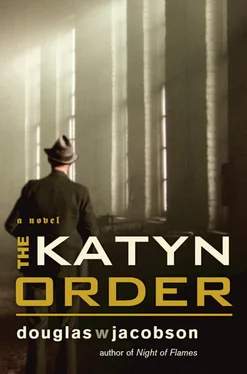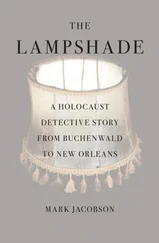Adam stared at the austere concrete building and the lethal gas cylinders, grateful now for every SS officer he’d assassinated. He turned to Andreyev.
The Russian looked him in the eye. With a barely discernible motion, Andreyev shook his head.
“I’ve seen enough,” Adam said.
The final stop was a wood-frame structure that looked like a small house, at the far end of the triangular-shaped camp. They got out of the car and walked up to the door. Vygotsky took out a ring of keys, fumbled around for the right one and unlocked the door. He clicked on the lights and motioned for them to enter.
Adam stood in the doorway and looked around in amazement. Covering all four walls were floor-to-ceiling shelves filled with hundreds of identical leather-bound volumes. A wooden table and four chairs filled the center of the room. Major Vygotsky tossed his hat on the table. He lit a cigarette and turned to Adam. “The records are very well organized, typical SS devotion to paperwork and detail. Now, what can we do for you?”
Adam produced the list of names he’d received from Whitehall. The last one was his uncle’s: Ludwik Banach.
It was a tedious process. Vygotsky pulled down volume after volume, while Adam flipped through the pages, read the various entries and wrote down the information. He had to admit, Whitehall’s staff had done their homework to make the exercise seem legitimate while obscuring the real reason for the search. Some of the persons on the list had been incarcerated at Sachsenhausen and some had not, as one might expect after the uncertainty of six years of war.
After what seemed an eternity, Adam found what he was looking for. On page 164 of volume 87, an entry read:
Reference Number: 23864
Date of Admission: 10 November 1939
Surname: Banach
First name: Ludwik
Domicile: Krakow, Poland
Religion: Roman Catholic
Occupation: University Professor
V293
Adam stared at his uncle’s name, finding it extremely difficult to maintain the detached demeanor of a diplomat investigating a list of names. The cold realization that his uncle had actually been imprisoned in this hellhole crushed him like a vise. He took his time writing down the information, being careful to prevent his hand from shaking. When he finished, he took a deep breath before he trusted himself to look at the Russian officers, who were chatting at the other end of the table. He motioned to Vygotsky and pointed to the last item of the entry. “V293 … what does that mean?” he whispered.
Vygotsky stepped around the table and leaned over the volume. Then, suddenly seeming agitated and talking rapidly, he scanned the shelves on the back wall of the room. He pulled down volume 293 and flipped through the pages.
“He says that this volume contains information on prisoners that were subject to special circumstances,” Andreyev said to Adam. “That’s very unusual. He says he’s only seen it one other time.”
Vygotsky continued to rifle through the pages of volume 293, then stopped and ran his finger down a page halfway through the thick leather-bound book. He bent down and studied one of the entries, then turned to Adam, his expression darkening into a scowl.
Adam read the neatly printed words.
Reference Number: 23864
Surname: Banach
First Name: Ludwik
Date of Release: 10 July 1940
Destination: Krakow, Poland
Special Orders: Transferred to the personal custody of Hans Frank, Governor, Government General – Poland.
He read them a second time, just to be sure.
“What does it say?” Andreyev asked.
Adam swallowed hard before he answered. “It says he was transferred to the personal custody of Hans Frank, Governor of Poland.”
The next evening, on the terrace of the German industrialist’s mansion in Berlin, Colonel Meinerz leaned forward in the wicker chair across from Adam. “Hans Frank?” It was the first time he had spoken during Adam’s detailed report of the events of the last twenty-four hours. “Let me make sure I’ve got this straight. You’re telling me that one of the persons on that list of yours was released from Sachsenhausen into the personal custody of Hans Frank, the Nazi Governor of Poland, the son of a bitch they call ‘the Jew Butcher of Poland’?”
Adam nodded, still unable to comprehend what it could possibly mean.
Meinerz had come directly back to Berlin upon hearing from Adam. It was late in the evening, and they were alone. “So, after not returning phone calls for a week, Kovalenko suddenly invites you to dinner, then arranges a private tour of Sachsenhausen. Any idea why?”
“No.”
Meinerz stood up and paced around the terrace. “Do you know that Hans Frank is in the custody of the American Army? That he is being held in Nuremberg, charged with war crimes?”
Adam felt as though he were drifting through some macabre dream. “Yes, I know.”
“Jesus Christ, Adam, the Russians will jump all over this. Most of the big Nazi fish got away from them and surrendered to us—Goering, Speer, Jodl, Frank. They’re really pissed off about it and grabbing anyone still out there. You’re damned fortunate those prison guards and your driver were Red Army officers. When the NKVD finds out about this, you can bet your ass we’ll be hearing from them.” Meinerz pulled out a pack of Camels, lit one and blew out a long column of smoke. “Who was this person anyway—the one released into Frank’s custody?”
“His name is Ludwik Banach.”
“Yeah, that’s fine, but who the hell is he? And why was he on that list?”
Adam studied Meinerz. He seemed like a straight-up sort, an honest army officer and JAG lawyer. Adam felt he could trust him, and he owed him something after the deception. But he couldn’t tell him everything. “He’s my uncle.”
“He’s what … your uncle?” Meinerz stood with his hands on his hips, glaring down at Adam. “What the fuck is going on here, Adam… Mr. Nowak… or whoever the hell you really are? Why didn’t you tell me right up front what you were looking for?”
“I couldn’t. I’m under orders from the British SOE.”
“Well that’s just great! You’ve got some secret orders from the British spooks that I don’t know anything about. What else haven’t you told me? Do the Russians know that Banach is your uncle?”
“Yes, it’s possible they do. I know that they’ve investigated my background. I lived with my uncle when I was going to law school in Krakow. It wasn’t a secret.”
“But I’ll bet they didn’t know that your uncle was sent to Sachsenhausen and then released into the custody of Hans Frank.”
Adam shook his head. “I’m sure they didn’t. I didn’t know that until yesterday.”
Meinerz stubbed out his cigarette in an ashtray. “Why would Hans Frank have had any interest in your uncle, a university professor?”
Adam tried to focus, to come up with an answer, but it was hard to concentrate. His emotions were drained from anxiety over what this could mean. Finally, he just said, “I don’t know.” It was true. He had no idea, though he had been thinking about nothing else since reading the extraordinary entry in “volume 293.” He stood up, so that he was face-to-face with Meinerz. “Look, I’m sorry about the deception. I had no idea about this business with Hans Frank. But I need your help. I’ve got to report this to SOE, and I’ve got to do it quietly. It can’t go through channels.”
Meinerz was silent for a long moment, looking Adam in the eye. Finally he nodded. “Yeah, sure, whatever you need.”
26 MAY
ADAM SAT ON THE FRONT PORCH of the former Nazi’s mansion, reading Stars and Stripes, trying unsuccessfully to relax. The front page article was an optimistic report on the upcoming Potsdam conference, filled with flowery references to “freedom across Europe.” Adam snorted and tossed the paper to the ground. Obviously the reporter had never dealt with the Russians.
Читать дальше












